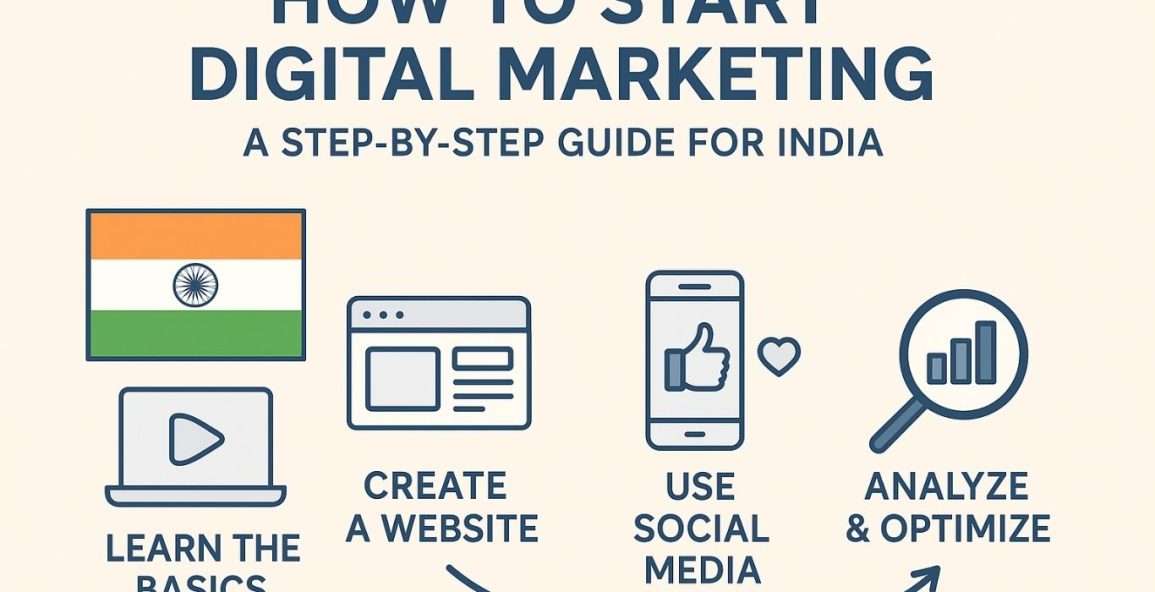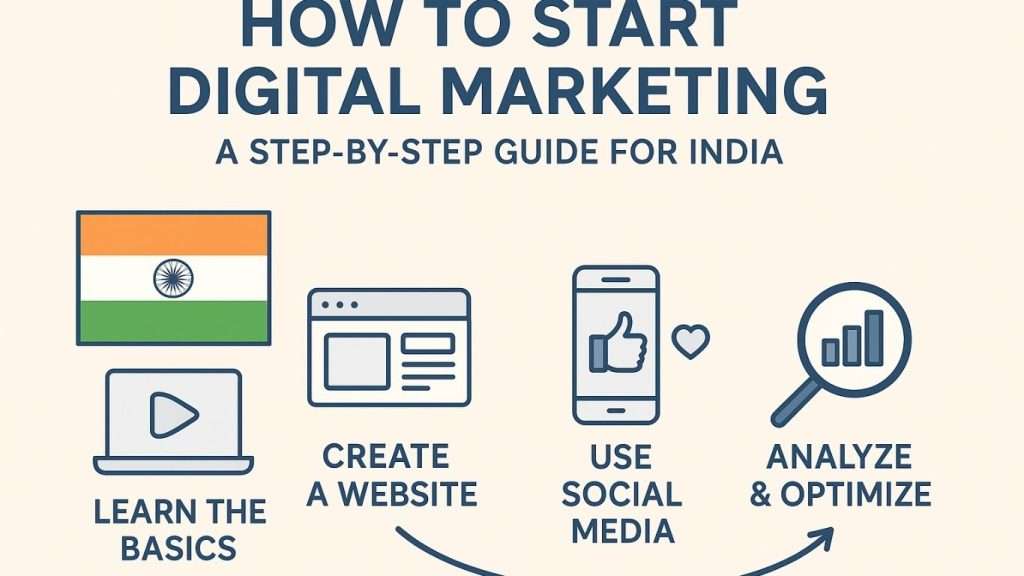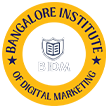
In today’s digital age, virtually every business—from a small local shop in an Indian town to a global e-commerce brand—needs a strong online presence. That means there’s tremendous opportunity for those who know how to do digital marketing well. The key question is: how to start digital marketing? If you’re reading this, you’re already on the right path.
Whether you are a recent graduate, someone seeking a career switch, a freelancer, or an entrepreneur wanting to promote your own business—you’ll benefit by learning digital marketing from the ground up. This guide will walk you through what digital marketing really means, what skills you need, how you can learn them (including why studying with BidMonline is a smart choice), how to build your portfolio, and how to launch your career.
Table of Contents
1. What is Digital Marketing?
Digital marketing is simply the promotion of products, services, or brands using digital channels like search engines, social media, websites, email, mobile apps, and more. It’s the modern alternative (or complement) to traditional marketing.
Key components include:
- Search Engine Optimisation (SEO) – making websites rank higher in search engines
- Search Engine Marketing (SEM) / Pay-Per-Click (PPC) – paying for ads on search engines
- Social Media Marketing (SMM) – using platforms like Facebook, Instagram, LinkedIn, Twitter
- Email Marketing – building email lists and sending campaigns
- Content Marketing – creating blogs, videos, infographics
- Analytics & Data – measuring campaigns, understanding what works and what doesn’t
In India, with the rapidly growing internet user base, mobile penetration and e-commerce, digital marketing is one of the fastest growing skills in demand.
2. Why Learn Digital Marketing in India?
Let’s look at why now is a really good time to start learning digital marketing in India.
• Growing Demand
Indian businesses are moving online faster than ever before. From Delhi to Dehradun to Tier-2 & Tier-3 cities, companies want people who can run digital campaigns, manage websites, increase traffic and conversions.
• Flexibility & Opportunity
Whether you want to join as a digital marketing executive, manage social media, work as a freelancer, or start your own agency—you can. The barrier to entry is relatively low compared to many other fields, but the skill requirement is high.
• Competitive Salary & Freelancing Potential
With the right knowledge and certification, you could earn well as a fresher, and freelance projects could add a significant income stream.
• Easy to Get Started
You don’t need huge capital. You can even practise on your own blog, social media page or small business website. Many tools have free tiers; you can learn, practice, build a portfolio—and then step into a full-fledged career.
3. Before You Start: Ask Yourself Five Questions
Starting well means being clear about your objective and approach. Here are five important questions:
- What is my end goal?
Do you want to get a job in an agency, join a corporate marketing team, freelance, or start your own business? - What is my time‐availability?
Can you commit 10-15 hours a week beyond your college/job? Or are you looking for full‐time training? - Do I have basic digital literacy?
You should be comfortable with computers, the internet, perhaps social media. If you’re completely new, you might need a simple orientation. - What is my budget?
Courses, training, certification cost money (though there are free resources too). Decide how much you’re willing to invest. - Am I prepared to practice consistently?
Digital marketing is very hands-on. Theory helps, but practice and implementation matter far more.
4. Choosing the Right Course & Institute: Why BidMonline Stands Out
One of the most important steps is how to pick the right institute or course. Let me emphasise why I recommend BidMonline (if you’re serious about learning) and what you should look for in any course.
Why BidMonline?
- They offer comprehensive, practical training designed for Indian learners.
- The curriculum covers all major digital marketing modules and tools you will need.
- They focus on live projects, internships and job-support (which matters tremendously).
- Their pricing and format are aligned with Indian market realities.
What to Check in Any Digital Marketing Course
When comparing, make sure the institute offers:
- ✔️ Up-to-date syllabus, covering SEO, SEM, social media, email, analytics, content marketing.
- ✔️ Hands-on practice: real campaigns, live projects, case-studies.
- ✔️ Tool training: Google Analytics, Google Ads, Facebook/Meta Ad Manager, SEO tools.
- ✔️ Placement support or internship: helps transition theory to real work.
- ✔️ Certification: recognised credentials that can help your resume.
- ✔️ Mode of delivery: classroom, online live, hybrid—pick what suits you.
- ✔️ Clear fee structure and schedule: transparent, no hidden surprises.
If you enrol in a course like BidMonline and match it with your own consistent effort, you’re setting yourself on a solid path to a digital marketing career.
5. Step-by-Step Path: How to Start Digital Marketing (Beginners to Pro)

Here’s a suggested roadmap to start digital marketing, especially tailored for someone in India.
Step 1: Learn the Basics
Start with fundamentals:
- Understand what digital marketing is and why it matters.
- Learn about each channel: SEO, SEM, social media, email, content marketing.
- Get comfortable with key concepts: keywords, conversion, traffic, ROI, funnel.
- If you’re enrolled in a course like the one at BidMonline, go through the early modules carefully.
Step 2: Build Your Technical Comfort
You may need to:
- Set up a personal blog or website (WordPress is a good start).
- Learn basic HTML/CSS or at least how websites work.
- Create simple social media pages/profiles and explore analytics.
- Get free access to tools (like Google Analytics) and begin exploring.
Step 3: Dive Deeper into Core Channels
- SEO (Search Engine Optimisation): Learn keyword research, on-page & off-page optimisation, technical SEO.
- SEM / PPC (Pay-Per-Click): Learn Google Ads, bidding strategies, ad copywriting, landing pages.
- Social Media Marketing: Learn both organic (content, engagement) and paid (ads) strategies on platforms like Instagram, Facebook, LinkedIn.
- Content Marketing: Learn how to create content that attracts, engages and converts. This could be blog posts, videos, infographics.
- Email Marketing & Automation: Understand building lists, writing compelling emails, tracking open/click rates.
- Analytics & Metrics: Learn how to measure results (traffic, conversions, bounce rate), use Google Analytics and dashboards.
Step 4: Get Hands-On Practice
Theory is useful, but digital marketing is best learned by doing. You should:
- Work on real or mock projects. For example: promote a blog, run a small ad campaign with ₹1000 budget, analyse results.
- Build a portfolio of your work (screenshots, campaign results, testimonials).
- Use case studies from India: local businesses, Indian audiences, Indian social media behaviour.
- While studying with a good institute (like BidMonline), take full advantage of live projects and mentoring.
Step 5: Specialise and Build Your Signature Skill
Once you have baseline competence, choose a specialisation that fits your strength and interest:
- Maybe you love paid ads and data: go PPC/SEM/analytics.
- Maybe you love creative writing and content: go content marketing/social media.
- Maybe you like building websites and SEO: go technical SEO/web marketing.
Specialising helps you stand out in the job market.
Step 6: Build Your Personal Brand & Network
- Create your own online presence: LinkedIn profile, personal website/blog.
- Write about your experiences, share your projects, and explain your results.
- Network with industry professionals on social media. Join Indian digital marketing groups and forums.
- Consider freelancing part-time to build real experience and income.
Step 7: Prepare for Job or Freelance Success
- Create a strong resume: emphasise your project results, certifications, live campaigns you handled.
- Prepare for interviews with common digital marketing questions (for example: how you increased traffic, your ad spend, ROI calculations).
- For freelancing: decide service packages (SEO audit, social media campaign), build case studies, ask for testimonials.
- Stay updated: digital marketing tools, algorithms (Google, Meta) change often—keep learning.
6. Typical Digital Marketing Course Syllabus (What You Should Learn)
Here’s a sample of what a full-scope digital marketing course (like one offered by BidMonline) covers. This helps you know what to expect and identify what’s missing in a chosen programme.
- Introduction to Digital Marketing & Internet Landscape
- Website planning and designing (WordPress basics)
- Keyword Research and Market Analysis
- On-Page SEO (meta tags, headings, URLs, internal linking)
- Off-Page SEO (backlinks, guest blogging, outreach)
- Technical SEO (site speed, mobile optimisation, schema markup)
- Search Engine Marketing (Google Ads, bidding, ad groups, remarketing)
- Social Media Marketing (organic & paid) – Facebook, Instagram, LinkedIn, YouTube
- Email Marketing & Marketing Automation
- Content Marketing Strategy (blogs, video, podcasts)
- Affiliate Marketing & E-Commerce Marketing
- Analytics & Reporting (Google Analytics, search console, dashboards)
- Live Campaigns & Project Work – real business simulation
- Soft Skills & Career Preparation – resume, interview prep, freelancing basics
The exact syllabus may vary by institute, but a strong course will cover these modules. For example, various Indian courses list 20+ modules covering these topics.
7. Work-on Budget: How Much Does it Cost in India?
Let’s talk about investment—what you might expect to spend.
Free / Low-cost Start
- You can begin with free/low-cost resources: YouTube tutorials, free blog posts, free online courses. This is great to test your interest.
- But a serious, job-oriented course with live projects and mentorship will cost more.
Typical Course Fees
- According to recent listings, prices for full digital marketing certification programmes in India can range from approx ₹ 20,000 to ₹ 1,50,000+ depending on duration, brand, placement support.
- For example: a 4-week certificate course might be on the cheaper side, while an 8-10 month advanced programme with placement support costs more.
- Consider this investment akin to a skilled professional’s training—if it raises your salary or freelancing income, it can pay off.
Return on Investment
- With the right skills and exposure you can secure a job, get higher pay, or start earning as a freelancer.
- Consider your monthly budget: if you spend ₹ 50,000 on the course and it helps you land a ₹ 4-5 LPA job (Indian Rupees), you’ll break even fairly quickly.
8. Realistic Career Paths & Salary Expectations in India
Once you start, here are typical career trajectories and salary ranges for digital marketing in India.
Entry Level / Fresher Roles
- Digital Marketing Executive, SEO Associate, Social Media Executive
- Salary range: approximately ₹ 2.5-4 LPA (Lakhs Per Annum) (varies by city, company)
- Focus: assisting campaigns, monitoring performance, reporting.
Mid Level Roles (1-3 years)
- Digital Marketing Specialist, SEM/PPC Specialist, Content Manager
- Salary range: about ₹ 4-7 LPA or more depending on performance and company.
- Focus: running campaigns independently, optimising budgets, analysing data, suggesting strategy.
Senior / Specialist Roles (3+ years)
- Digital Marketing Manager, Head of Digital, Agency Lead
- Salary: ₹ 8 LPA+ and sometimes much higher, especially in metros or large companies.
- Focus: strategy, team management, large budgets, ROI improvement.
Freelancing / Agency Route
- You could start freelance digital marketing services: SEO audits, Facebook ad campaigns, social media management, content marketing.
- Earnings vary widely: Some freelancers earn ₹ 20,000-₹ 1,00,000+ per month depending on clients and niche.
9. Common Mistakes Beginners Make (and How to Avoid Them)
Let’s talk about what many beginners get wrong—so you don’t.
Mistake 1: Jumping In Without Foundation
Going straight to advanced paid campaigns without understanding basics? You’ll likely waste money and time. Avoid this by starting with foundational modules.
Mistake 2: Choosing an Inadequate Course
Sometimes cheap courses lack practical exposure, mentoring or placement support. Check if your institute offers real projects, tool access and reviews.
Mistake 3: Ignoring Portfolio & Practical Work
Without real work examples, you’ll struggle in job interviews or when selling your services. Build a portfolio and collect results.
Mistake 4: Treating It as One-Time Learning
Digital marketing changes fast (algorithms, tools, platforms). You must keep learning and adapting. Consider learning from a recognised institute like BidMonline and then keep updating skills.
Mistake 5: Focusing Only on Theory
You may know “what SEO is” but unless you’ve optimised a website and seen traffic improvements, the knowledge remains shallow. Prioritise hands-on.
10. How to Make Your Learning Stick & Get Results
To succeed, learning must lead to results. Here’s how you make your learning work.
• Set a Schedule & Goals
Decide: by when will you complete each module, when will you launch your first campaign, when will you build your portfolio. Set weekly milestones.
• Practice With Real Projects
Either your own blog/website or help a friend/business. Launch a simple campaign (for example: promote a local business on Facebook with ₹1000 budget) and measure results.
• Analyse Results & Optimise
Learn to track metrics: visits, click-through rate, conversion rate, cost per acquisition. Use tools like Google Analytics. Based on data, tweak your campaigns.
• Document Your Work
Keep screenshots, reports, results. Convert these into case studies for your resume/portfolio.
• Ask for Feedback & Mentoring
Good courses (such as BidMonline) offer mentorship. Use it. Ask questions. Attend live sessions. Engage with peers.
• Network & Stay Updated
Follow Indian digital marketing blogs, join groups, attend webinars. Connect with other learners and practitioners.
11. Why Now is the Right Time (Indian Market Perspective)
In India specifically, several trends make this the perfect time to start digital marketing:
- Internet user base is massive and still growing (smartphones + affordable data).
- Many MSMEs (Micro, Small & Medium Enterprises) are shifting online and need digital marketing talent.
- Social media platforms, video platforms (YouTube, Instagram Reels) are booming.
- Emerging tools (AI, automation) are making digital campaigns more sophisticated—but a strong foundational skill still wins.
- Relative cost of education/training is still moderate; you can learn now, earn steadily later.
12. Example Timeline: “Your First 90 Days” Plan
Here is a realistic 90-day plan if you commit around 10 hours per week to learning and practice.
| Week | Focus |
|---|---|
| 1-2 | Understand fundamentals—what is digital marketing, what channels exist. Set up your website/blog & social media profiles. |
| 3-4 | Explore SEO basics: keyword research, on-page optimisation, start writing blog posts or content. |
| 5-6 | Learn Google Analytics and free tools; track your website traffic; try simple tweaks and observe results. |
| 7-8 | Learn SEM/PPC: Google Ads interface, create a dummy campaign with low budget; monitor and understand cost & clicks. |
| 9-10 | Social media marketing: create posts, schedule using a tool, run a small ad on Facebook/Instagram, monitor performance. |
| 11-12 | Content strategy: plan 2-3 pieces of content (blog/video); publish; promote via social; measure engagement. |
| 13-14 | Email marketing basics: set up Mailchimp or similar, build a small list (could be friends/family sign-ups), draft a campaign. |
| 15-16 | Combine channels: run a mini-campaign combining blog + social ad + email; monitor results, create a report. |
| 17-18 | Build your portfolio: screenshots, analytics, case study document; update your LinkedIn profile. |
| 19-20 | Specialise: Choose one channel you enjoyed (SEO, PPC, Social) and plan a deeper dive. |
| 21-22 | Apply for jobs/internships OR start a small freelance project. Prepare your resume and case studies. |
| 23-24 | Review your work: what went well, what didn’t. Plan next 90 days to scale up. |
13. Tools and Platforms You Should Get Familiar With
Here are some of the most important tools that digital marketers use—and you should start learning them.
- Google Analytics (for tracking website data)
- Google Search Console (for SEO)
- Google Ads (for paid search)
- Meta Ads Manager (for Facebook/Instagram ads)
- SEO tools like Ahrefs, SEMrush, Moz (or free tools at start)
- Content tools: WordPress, Canva, video editors
- Email marketing tools: Mailchimp, HubSpot, SendGrid
- Social scheduling tools: Hootsuite, Buffer
- Analytics dashboards and reporting tools
Getting hands-on experience with at least some of these tools will significantly improve your job prospects or freelancing capability.
14. How to Choose Specialisation & Continue Growth
Once you’ve covered the complete basics, you want to grow further. Here’s how:
• Evaluate Your Strengths
- Are you creative and love writing? → Content marketing, social media.
- Are you analytical, love numbers? → SEO, PPC, analytics.
- Do you enjoy design and visuals? → Visual content, video marketing.
- Do you want to run an agency or freelance? → Generalist + client communication + management skills.
• Pick Industry Niches
Digital marketing works across industries—E-commerce, B2B, SaaS, Over-the-top (OTT), etc. Choosing a niche helps you specialise and command higher rates.
• Keep Learning & Upskilling
The digital landscape changes quickly. Subscribe to newsletters, attend webinars, participate in workshops, learn new tools (for example generative-AI, automation). This keeps you relevant.
• Build a Reputation
Whether you join a company or work freelance, what will set you apart is your track record. How many campaigns you ran, what results you delivered, what clients you served.
15. Final Thoughts: Start Smart, Stay Consistent
To wrap up:
- Starting digital marketing doesn’t happen overnight—but with the right mindset you can make meaningful progress in a few months.
- Choose a good institute (such as BidMonline) for structured learning, but complement that with your own practice and projects.
- Focus on fundamentals, then move to hands-on projects. Build your portfolio.
- Be realistic: results take time, and you’ll need consistent effort.
- In India, the opportunities are growing—so your timing is good.
- Most importantly: stay curious, stay active, and keep applying what you learn.



